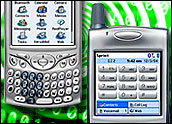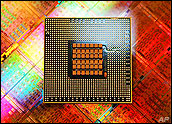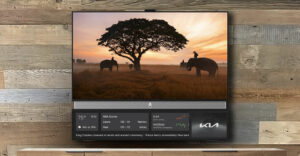
SanDisk has renamed and launched its USBTV flash memory-based gadget, introduced in January, and says the Sansa TakeTV video player is an easy way for people to watch on the televisions video content downloaded on their computers.
Described by the company as a “smart, simple and seamless way to easily take videos from a PC to nearly any TV,” the Sansa TakeTV device connects to PCs via the USB port. Digital video content downloaded onto the computer’s hard drive is dragged to the Sansa TakeTV player which gets plugged into a cradle that is attached to the TV.
“Using the Sansa TakeTV video player is as simple as using a USB flash drive,” said SanDisk. The cradle plugs into standard audio/video jacks found on virtually all television sets.
SanDisk first announced USBTV in January at the Consumer Electronics Show.
Plug and Play
When turned on, the player displays on the TV screen a “simple, on-screen guide” that allows users to choose the downloaded video content they want to watch, said SanDisk. This can be done using a remote control that comes with the package.
Sansa TakeTV is “the most easy-to-use, straightforward solution for watching downloaded personal video content and other shows in the comfort of the living room,” said Daniel Schreiber, senior vice president and general manager for SanDisk’s audio/video business unit.
It was SanDisk, with the introduction of its Cruzer USB flash drives, that brought the same type of simplicity to moving content between PCs, he added. “We challenged ourselves to bring this same simplicity to transferring video from the PC to the TV,” he said.
Tactical Solution
The Sansa TakeTV player will work with TV systems that have standard AV composite inputs or S-Video. SanDisk said the unit supports a number of video formats, including DivX, XVID and MPEG-43. The Sansa TakeTV player is DivX certified for home theater and works with Windows Vista, Windows XP and the latest versions of Mac OS X and Linux, according to SanDisk.
The units come in two sizes — a 4GB version that can hold about five hours of video, and an 8GB model that can hold up to 10 hours. The smaller Sansa TakeTV has a manufacturer’s suggested retail price of US$99.99 and the bigger one is priced about $50 more.
Jupiter Research analyst Michael Gartenberg said the device is likely to be most popular with people who have large collections of digital video.
“It’s a really good, tactical solution for a specific problem: How do you get content from your PC on your TV set without having to hardwire them together or get the whole network involved?” he told TechNewsWorld. “At this point, it’s more of an enthusiast type product for people who have large video collections. The device itself is very, very clever and it provides a particular solution in a fairly elegant way.”
Give Them the Big Screen
While the popularity of YouTube and other online sources shows that people like to use their computers to find digital video, SanDisk said most people prefer using their televisions to view video content.
“Research shows that TV is the ultimate viewing experience for videos, including TV content and movies,” said the company. “At the same time, the PC has become the foremost vehicle for searching and downloading digital content. Yet to date, solutions that allow you to download on the one and watch on the other have been thorny and complex.”
SanDisk also announced a beta release of Fanfare, a new digital entertainment content distribution platform. The Web service, designed to work with the Sansa TakeTV device, offers TV shows, movies and other video content that can be downloaded to the device.
The service features content from CBS, Jaman.com, Showtime Networks, Smithsonian Networks, The Weather Channel and TV Guide Broadband. Some of the content is ad-supported and free while some is fee-based, said SanDisk.
YouTube on the Boob Tube
The Sansa TakeTV sounds like a good idea to Jimmy Schaeffler, senior research analyst with The Carmel Group. He agreed with SanDisk’s assertion that people want an easy way to watch video on bigger screens.
“The one thing that has been missing from the YouTube world of today is the future screen of tomorrow,” Schaeffler told TechNewsWorld. “What I’m saying is it would be a lot better to be able to watch on the larger screen some of the YouTube video you enjoy so much.
The relatively low price of the SansaTakeTV device should make it a winner, Schaeffler predicted. “It could work. If you can wed the best hardware with the best content, you’ve got a winner. I would tend to be basically optimistic. I would say that’s a real positive forward step.”
The fate of Fanfare is less certain, in Schaeffler’s opinion. “For so many of these … sometimes as important as the product, service, software or hardware is the partnerships they make,” he said. “Very often, in today’s tech world, you come along with a great technology, but your company may not be the best at bringing it to the consumer or providing it with a mass audience.”




















































